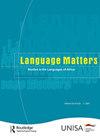Politics and Power in Southern Ethiopia: Imposing, Opposing and Calling for Linguistic Unity
IF 0.8
3区 文学
0 LANGUAGE & LINGUISTICS
引用次数: 0
Abstract
Abstract In 2018 there were demands for the creation of new regional states in Ethiopia by ethnolinguistic groups seeking greater self-determination. Two examples of this were the Sidama and Wolaita, with some members of the latter advocating for the creation of an “Omotic Peoples” regional state. The idea of Omotic unification is not new to southern Ethiopia. When the amalgamated language of Wogagoda was introduced in the 1990s, the peoples of the region rallied in opposition against government. This article explores the intersection of language, politics and power during that period, which resulted in the withdrawal of a language policy and the creation of new, disintegrated administrative structures. Drawing upon historical experiences, this article reflects on the role of ethno-linguistic identities and their implications for contemporary decision making about languages of instruction and administrative boundaries. The results provide insight into situational contexts that may enable or constrain bottom-up and top-down language policy processes.埃塞俄比亚南部的政治与权力:强制、反对和呼吁语言统一
摘要2018年,寻求更大自决权的民族语言团体要求在埃塞俄比亚建立新的地区国家。这方面的两个例子是Sidama和Wolaita,后者的一些成员主张建立一个“Omotic Peoples”地区国家。奥莫蒂奇统一的想法对埃塞俄比亚南部来说并不新鲜。当沃加戈达语在20世纪90年代被引入时,该地区的人民团结起来反对政府。本文探讨了这一时期语言、政治和权力的交叉,这导致了语言政策的退出和新的、解体的行政结构的产生。本文借鉴历史经验,反思了民族语言身份的作用及其对当代教学语言和行政边界决策的影响。研究结果提供了对情境背景的深入了解,这些情境背景可能会启用或限制自下而上和自上而下的语言政策过程。
本文章由计算机程序翻译,如有差异,请以英文原文为准。
求助全文
约1分钟内获得全文
求助全文
来源期刊

Language Matters
Multiple-
CiteScore
1.20
自引率
0.00%
发文量
19
期刊介绍:
The purpose of Language Matters is to provide a journal of international standing with a unique African flavour focusing on multilingualism in Africa. Although the journal contributes to the language debate on all African languages, sub-Saharan Africa and issues related to multilingualism in the southern African context are the journal’s specific domains. The journal seeks to promote the dissemination of ideas, points of view, teaching strategies and research on different aspects of African languages, providing a forum for discussion on the whole spectrum of language usage and debate in Africa. The journal endorses a multidisciplinary approach to the study of language and welcomes contributions not only from sociolinguists, psycholinguists and the like, but also from educationalists, language practitioners, computer analysts, engineers or scholars with a genuine interest in and contribution to the study of language. All contributions are critically reviewed by at least two referees. Although the general focus remains on multilingualism and related issues, one of the three issues of Language Matters published each year is a special thematic edition on Language Politics in Africa. These special issues embrace a wide spectrum of language matters of current relevance in Southern Africa.
 求助内容:
求助内容: 应助结果提醒方式:
应助结果提醒方式:


